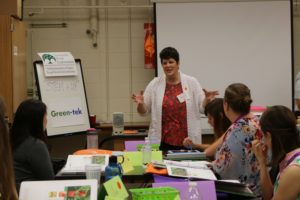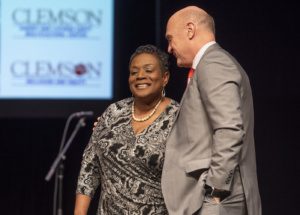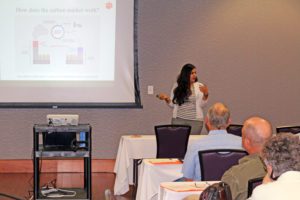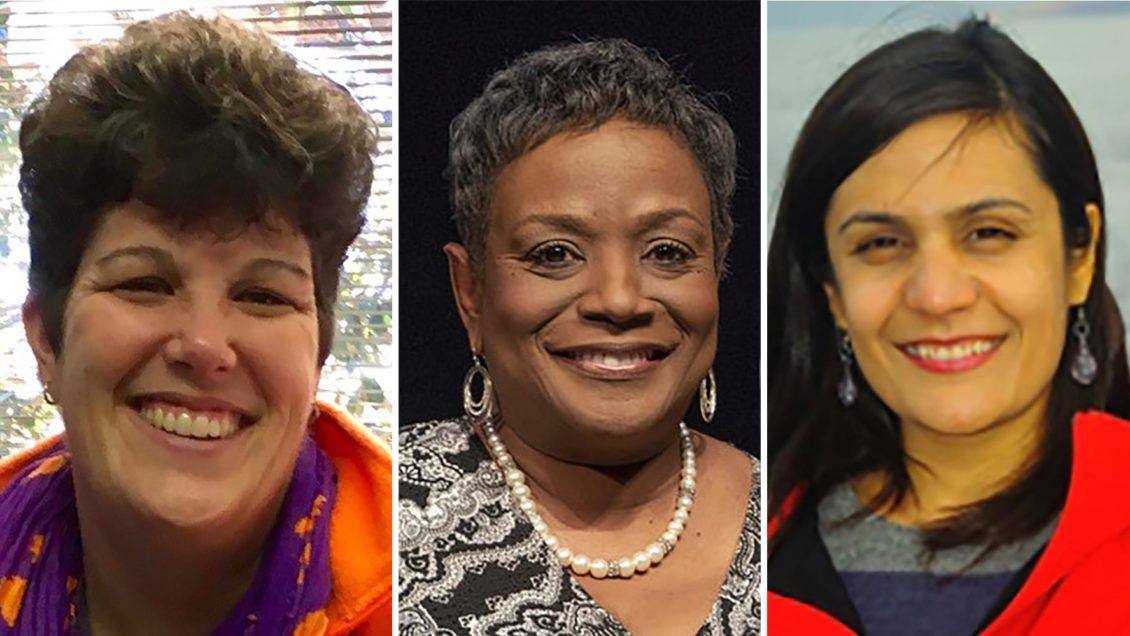More than any college within Clemson University, the College of Agriculture, Forestry and Life Sciences (CAFLS) exemplifies founder Thomas Green Clemson’s vision of a high seminary of learning that would reach beyond the boundaries of campus to benefit South Carolina, its people, land, wildlife, natural resources and economy.
CAFLS is the instrument through which Clemson delivers its three-fold land-grant mission of teaching, research and Extension through world-class educational, inquiry and outreach opportunities, and partnerships with private industry and state and federal agencies.
That means that beyond Clemson’s main campus, Clemson personnel take the knowledge gleaned from the university around the state through Extension offices in all 46 counties in South Carolina and conduct research at its six Research and Education Centers (RECs) strategically located throughout the state according to the state’s distinct soil and climate regions, collectively known as the Clemson Experiment Station.
And women are taking on key roles in each of those three aspects — education, research and outreach — to help guide Clemson’s land-grant mission into a future where the coming generations of female leaders at the university have seen exactly what is possible … and almost certainly picked up an idea or two of their own about how to continue to push the envelope.
Paving the way in agriculture
A passion to teach, a love for research, a strong support system and a desire to step away from the “norm” is what led Catherine DiBenedetto to become an agricultural education professor.

DiBenedetto came to Clemson in July 2015. She is the first and only female professor in the Clemson Agricultural Sciences Agricultural Education program since its inception more than 100 years ago.
“When I first joined the department, I quickly became an integral part of leading efforts to make changes that were needed to improve the agricultural education program,” DiBenedetto said. “My colleagues welcomed my input and I utilized my expertise to add rigor and relevance to the courses I teach in the teacher preparation program.”
Her formal education includes a bachelor’s in agriculture with a concentration in ornamental horticulture, a master’s of instruction in education and a doctorate in agricultural education. But lessons she learned related to agriculture began long before she started college including watching her grandfather grow and sell mushrooms in Kennett Square, Pennsylvania – the Mushroom Capital of the World – and helping her parents tend to the garden and yard.
“First and foremost, my parents imparted a sound foundation for ensuring my strong work ethic that I believe has become the most important characteristic of my success throughout my life,” she said. “Lately, I’ve found myself reflecting quite frequently on my past growing up in a small suburban area; yet having solid roots to agriculture.”
DiBenedetto attended Thomas McKean High School in Wilmington, Delaware, which she said has “an excellent” agricultural education program and Future Farmers of America (FFA) chapter. Her agricultural education teacher, Keith Walker, taught students where food comes from and the importance of being good citizens. Support from family and mentors has helped lead her down the male-dominated career path she follows today.
“In nearly every job I had throughout my life, I found myself in male-dominated fields,” DiBenedetto said. “I did not let ‘traditional male roles’ stop me from applying for positions when I was qualified to meet the demands of the job. Now more than ever, I believe it is so important for women to see strong female role models paving and leading the way in agriculture because there are so many outstanding career opportunities that could potentially go overlooked by young, brilliant women if they do not have ample support and mentorship.”
DiBenedetto strongly believes in mentorship and helped create a method for helping new faculty members in the Agricultural Sciences department receive the guidance they need to succeed. Beginning this year, new faculty hires in the department will have formal mentoring committees to help navigate their careers and the promotion and tenure process.
Leading from the front
Leadership means different things to different people, and perhaps the most common connotation is leadership is simply a position one holds in charge of a group or organization. But for Deon Legette, the act of leading requires just that: action — moving the group in a forward direction with a definitive purpose.

Legette has been serving South Carolina residents through Cooperative Extension Service for three decades, as she began her career with Clemson as a Family and Consumer Sciences agent in Lexington County before moving to Kershaw County where she served as Regional Lead Agent, Food Safety/Nutrition agent and 4-H Youth Development agent for 12 years. Legette now serves as the Midlands District Extension Director and Interim Assistant Director of Extension Field Operations-Personnel Management, based in the Richland County office.
But while service is certainly a key component of Legette’s career, it is her vision for the future that truly epitomizes her leadership.
After taking part in the President’s Leadership Institute, a nine-month leadership development program started by President James P. Clements, Legette had the idea of creating a similar leadership program in the extension to help foster the next generation of Extension leaders.
“The thing that really touched me the most was the fact that President Clements took time out of his schedule every single day of the class to be there,” she said. “He was there at every single session and taught us something in a lot of the sessions, and I remember thinking, ‘Whoa, this man is something.’ He really demonstrates his principles of leadership. I would like to thank Kyra Lobbins and Max Allen for their leadership in coordinating the PLI sessions. The program was life-changing for me”
And Legette took those principles and applied them to her own program, the Extension Emerging Leadership Initiative (EELI). After a successful inaugural class in 2019-20, Legette recognized the best way to avoid standing still was to keep moving forward.
With that in mind, Legette, the driving force behind EELI’s creation, said while the mission of the 2021-22 cohort remained similar to the first, there are also notable differences, including the addition of three faculty and staff from CAFLS, which includes Extension operations around the state, and three participants from South Carolina State University’s 1890 Research Extension and Extension Program.
For her hard work, leadership and vision, Legette in 2020 was honored with the prestigious Martin Luther King Jr. Award for Excellence in Service. The award is presented each year by the President’s Office and the Division of Inclusion and Equity at Clemson University to recognize individuals for outstanding service in advancing Dr. Martin Luther King, Jr.’s vision of the “Beloved Community” (a society where justice, equal opportunity and love of one’s fellow human beings prevail). Other related awards in 2020 include Professional Staff Award for CAFLS and Clemson Alumni Award for Cooperative Extension Public Service.
Legette developed EELI to assist county agents, Extension associates and others in Extension with professional development and personal leadership to produce the next generation of Extension leaders.
“This was something that was totally new for Cooperative Extension Service, and I wasn’t sure how it would be received,” she said. “I am very grateful for Dr. (Tom) Dobbins’ support and sponsorship of EELI. Much of our success comes from his trust in me to lead our emerging leaders.”
But for Dobbins, director of Extension, the proof is in the pudding: “Deon is helping to create a culture of success and is helping Extension Agents and Associates reach their full potential. The EELI participants are making a huge difference in our organization and I am very grateful to Deon for all her hard work on this.”
‘Nothing can stop us’
Growing up in Mashhad, the second largest city in Iran with its beautiful parks and shrines, it seems Marzieh Motallebi was destined to follow a career path leading to nature preservation.

With support from her family, she found her passion in nature, beautiful plants, ecosystems, and sustainability at a young age. Her parents encouraged her to follow her dreams, while teaching her that “hard work and patience will pay off.”
Today, she is an environmental economist and assistant professor stationed at the Clemson University Belle W Baruch Institute of Coastal Ecology and Forest Science in Georgetown, South Carolina, where she works on ecosystem services valuation and studies market-based solutions for environmental issues.
“My passion is working on ecologically sound and economically viable conservation plans,” Motallebi said. “I hope that during my career, I am able to increase awareness about the value of services provided by our ecosystems through my Extension and outreach activities. I hope to see more lands are put under protection and conservation plans based on results of our studies.”
Motallebi earned a doctorate in ecological economics from Colorado State University. Her master’s and bachelor’s degrees are in agricultural economics from the Ferdowsi University of Mashhad, Iran. She began working for Clemson in November 2015. Motallebi said coming to Clemson was “one of the best decisions of (her) life.” She said she loves her job, collaborating with colleagues and working with the students.
For young girls thinking about following the same career path, Motallebi says to “dream big and work hard.”
“Nothing can stop us from doing good work for the environment,” Motallebi said. “This career is full of joy and rewards. Nothing is more rewarding than being in touch with nature and working towards finding sustainable solutions for environmental issues. I urge younger women to look into this area of study. I believe that they will really like it.”
Motallebi believes the work she does is important for preserving the planet for future generations.
“We inherited our beautiful ecosystems from our parents and ancestors, and we have the responsibility to pass them to the next generation in a good condition,” Motallebi said. “Meeting our needs shouldn’t be at the price of compromising the ability of future generations to meet their own needs.”
Get in touch and we will connect you with the author or another expert.
Or email us at news@clemson.edu

